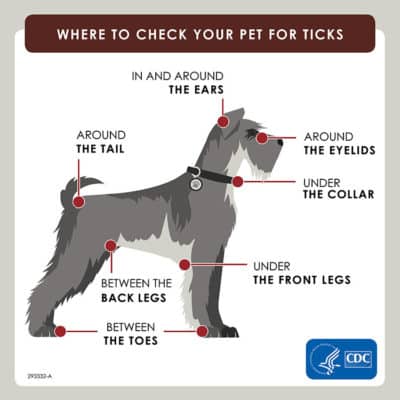
Tick season is here, and people are already spotting them. But it’s not just humans that are at risk. Dogs, outdoor cats, and horses are the pets most susceptible to tick bites and tickborne diseases and should be checked regularly. Vaccines are not available for many of the tickborne illnesses animals can contract, and vaccines won’t stop pets from bringing pests into your home.
“If dogs bring ticks or fleas into your house, it doesn’t matter what the temperature is outside, the fleas and ticks are going to reproduce and lay eggs in your home. Then you have a nightmare on your hands,” said Mark Jawitz, a veterinarian at Stoneham Animal Hospital in Massachusetts.
It’s important to throroughly check your pets for ticks when they come in from the outside.
“Most of the time, when they attach, they’re going to attach around the ears, the head or the neck or places like the armpit or the groin on a dog, the hot spots,” veterinarian Michelle Evason of Atlantic Veterinary College said. “That’s true for people too.”
Ready to protect your pets from ticks? Click here or call 1-800-323-7378 now!
A Warning for Cat Owners
The Centers for Disease Control and Prevention (CDC) recommend using a tick-prevention product. But be very careful if you have cats. They are extremely sensitive to a variety of chemicals. Do not apply any tick prevention products to your cats or dogs without first asking your veterinarian if it’s safe for your cat.
Never use permethrin insecticide around cats. Cats are easily poisoned by permethrin when they are exposed to the products used on dogs. Permethrin is a neurotoxin that is commonly used in insecticides and sometimes in flea and tick prevention products for dogs. It is also sprayed on clothes as a tick repellant for humans. There are many different repellants, shampoos, and rinses made for dogs that contain permethrin. They are fine for dogs, but toxic for cats.
Signs of permethrin poisoning can be life-threatening and include severe muscle tremors and uncontrolled seizures. It’s extremely important to seek medical help from a veterinarian immediately to alleviate suffering and improve chances of survival.
You Found a Tick: Now What?
 If you do find a tick on your pet, use a pair of tweezers or a tick spoon to remove it.
If you do find a tick on your pet, use a pair of tweezers or a tick spoon to remove it.
“You should take a pair of tweezers, and, as close to the attachment site – where it’s attached to the dog – grab and pull. That’s really all there is to it,” Dr. Evason said.
Ignore old wives’ tale tricks like using a lighter or smothering with petroleum jelly. When a tick is crushed it regurgitates and there’s a chance the Lyme-disease bacteria could be spread into the bite.
Don’t take chances with your pets’ health. Call Modern today at 1-800-323-7378!
Talk to Your Vet
The CDC recommends that pet owners talk to their veterinarians about the best tick prevention products for their pet, what tickborne diseases are in the area, and what the symptoms of these diseases are in your pet.
To further reduce the chances that a tick bite will make your pet sick, the CDC also suggests:
- Checking your pets for ticks daily, especially after they spend time outdoors.
- If you find a tick on your pet, remove it right away.
- Reduce tick habitat in your yard.
The Modern Solution
Modern Pest can help with the last part. Our Homecare Mosquito, Flea, and Tick Service provides a meaningful reduction in the populations of all three vector pests in your yard, resulting in less chance of exposure for your pets. Call Modern today at 1-800-323-7378 to sign up for service or get a free quote. Service starts at $99 per treatment for up to one acre and consists of six monthly treatments from April through September.
